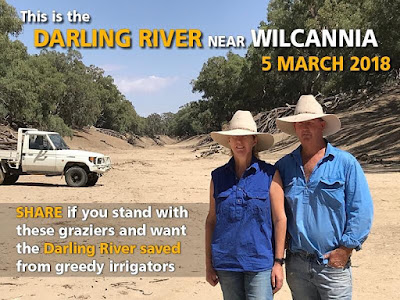Image sourced from Twitter
Having miserably failed to enforce even the most basic of safeguards against widespread water theft in the Murray Darling Basin - such as not allowing unmetered water extraction - the Murray Darling Basin Authority and then water resources minister and now humble Nationals backbencher Barnaby Joyce have left us having to rely on leaks to the media to find out the true state of play in the national water wars.
The ailing state of the
Darling River has been traced to man-made water extraction, according to a
leaked report by the agency charged with overseeing its health.
The "hydrologic
investigation", dated last November and obtained by Fairfax Media,
analysed more than 2000 low-flow events from 1990-2017 on the
Barwon-Darling River between Mungindi near the NSW-Queensland border down to
Wilcannia in far-western NSW .
The draft report – a
version of which is understood to have been sent to the Turnbull government for
comment – comes days after WaterNSW issued a
red alert for blue-green algae on the Lower Darling River at Pooncarie
and Burtundy.
The paper by
Murray-Darling Basin Authority's (MDBA) own scientists found flow behaviour had
changed since 2000, particularly in mid-sections of the river such as between
the towns of Walgett and Brewarrina.
On that section, low or
no-flow periods were "difficult to reconcile with impacts purely caused by
climate", the scientists said.
Indeed, dry periods on
the river downstream from Bourke were "significantly longer than
pre-2000", with the dry spells during the millennium drought continuing
afterwards.
Water resource
development – also described as "anthropogenic impact" – must also
play "a critical role" in the low flows between Walgett and
Brewarrina, the report said.
A spokeswoman for the
authority said the report was "undergoing quality assurance processes
prior to publication", with a formal release on its website likely in
coming days.
The MDBA commissioned
the internal team to "address some of the specific concerns raised"
by its own compliance reviews and those of the Berejiklian government, she
said.
Terry Korn, president
of the Australian Floodplain Association, said the report confirmed
what his group's members had known since the O'Farrell government changed the
river's water-sharing plan in 2012 to allow irrigators to pump even during
low-flow periods.
Poor policy had been
compounded by "totally inadequate monitoring and compliance systems",
Mr Korn said.
"Some irrigators
have capitalised on this poor management by the NSW government to such an
extent that their removal of critical low flows has denied downstream
landholders and communities their basic riparian rights to fresh clean
water," he said. "This is totally unacceptable."….
Fairfax Media also
sought comment from federal Agriculture Minister David Littleproud.
Once publicly outed for sitting on the review report the Murray Darling Basin Authority finally decided to publish it this week.
https://www.scribd.com/document/372999806/Murray-Darling-Basn-Compliance-Review-Final-Report-November-2017
The NSW government
intervened to urge the purchase of water rights from a large irrigator on the
Darling River that delivered a one-off $37 million profit to its owner while
leaving downstream users struggling with stagnant flows.
Gavin Hanlon, the senior
NSW water official who
resigned last September amid multiple inquiries into allegations of
water theft and poor compliance by some large irrigators, wrote to his federal
counterparts in the Agriculture and Water Resources Department, then
headed by Barnaby Joyce, in late December 2016 urging the buyback of water from
Tandou property to proceed.
The Tandou water
purchase proposal "should be progressed...given the high cost of the
alternative water supply solution" for the property south-east of Broken
Hill, Mr Hanlon wrote, according to a document sent on December 23, 2016 and
obtained by Fairfax Media.
Early in 2017, the
Australian Bureau of Agricultural and Resource Economics and Sciences estimated
the property's annual water entitlements of 21.9 billion litres to be
$24,786,750 "based on recent trade values", according to another
document listed as "Commercial in Confidence".
Despite this valuation,
the federal government by 16 March, 2017 would pay Tandou's owner Webster Ltd
more than $78 million. At its announcement on 21 June last year, Webster said
in a statement it "expects to record a net profit on disposal in the order
of $36-37 million".
The transfer of the
water rights are apparently the subject of inquiries by the NSW Independent
Commission Against Corruption, with several people saying they have discussed
their knowledge of the deal with the agency. An ICAC spokeswoman declined to
comment.







No comments:
Post a Comment